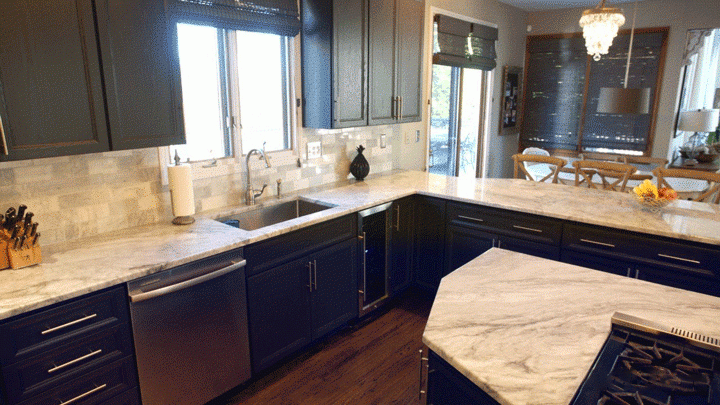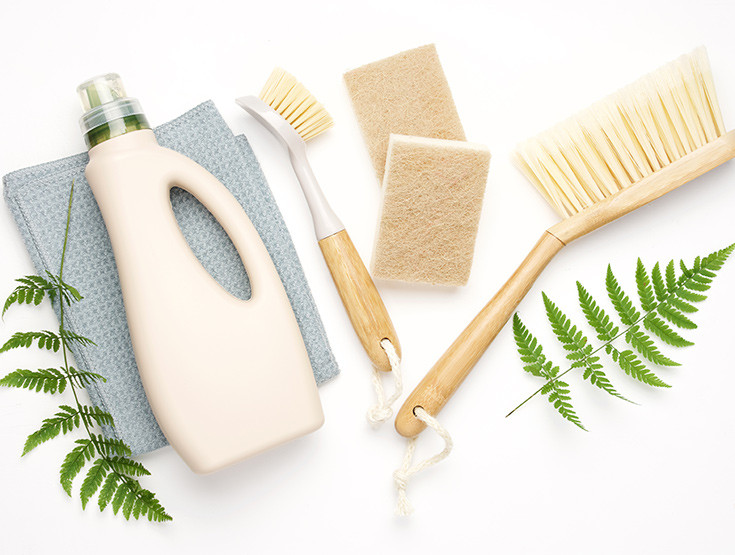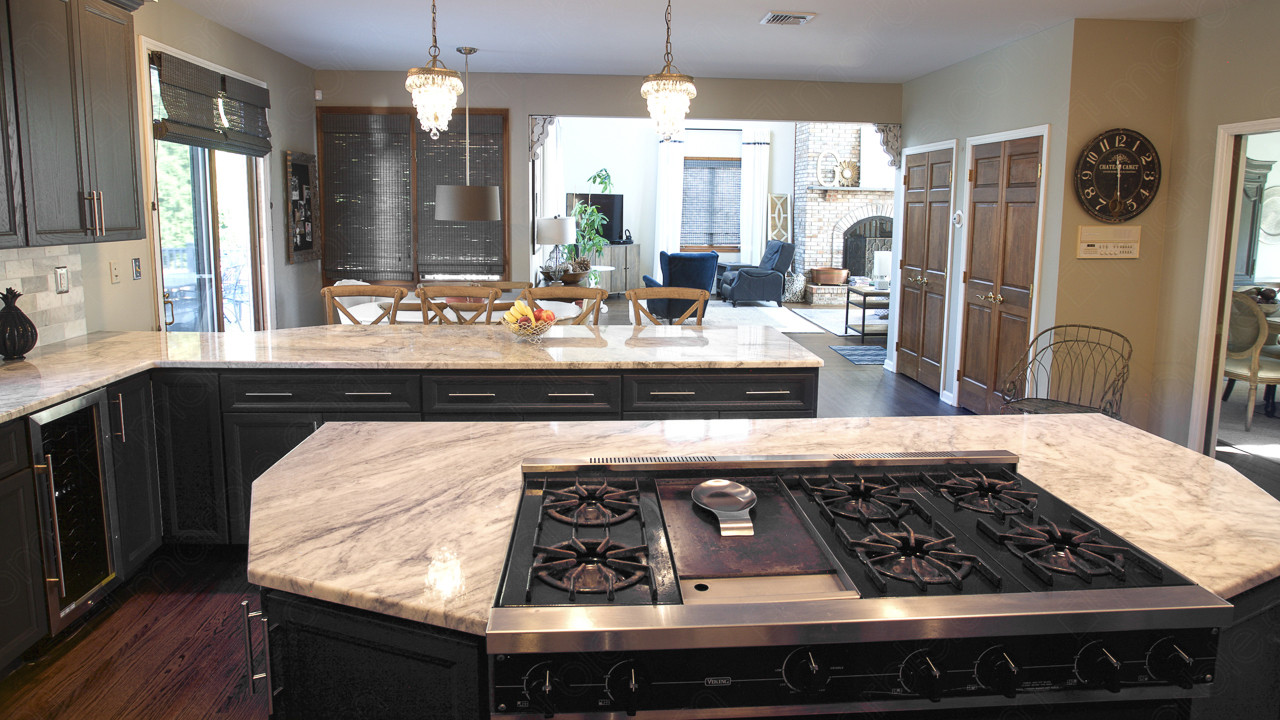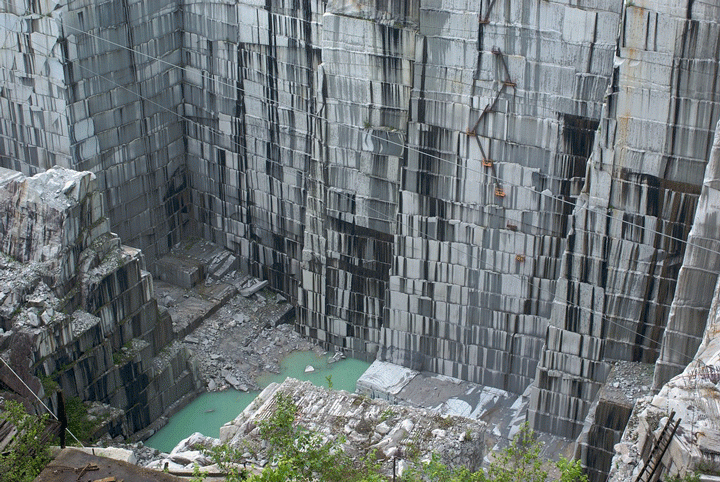
Table of Contents
There are several factors that you should think about before making your decision to purchase either quartz or quartzite. This guide will help you examine the differences between the two and help you determine which is better for your home.
Comparisons
How is Quartz Manufactured?
As mentioned, quartz countertops are made of engineered stone. The countertops are made by combining roughly 90 percent of the quartz mineral with about 10 percent resins, polymers and pigments. These percentages can differ slightly depending on the individual countertop.
Variations of Quartz Countertops
There are many different variations of quartz countertops, meaning you will not have to worry about a limited selection. Because the stone is engineered, it can be modified to look like natural stone if that is what you desire. It can also be cut in many different shapes and angles that your countertop might require.
How is Quartzite Formed?
Quartzite forms as a result of sandstone that has high quartz content being exposed to intense amounts of heat and pressure. It is one of the densest natural stone materials that you will be able to find.
[get_quote]
Variations of Quartzite Countertops
Quartzite can usually be found in shades of white and gray. However, there are other color options that exist. Variation in the coloring of different slabs is due to differences in mineral content.
Appearance
In recent years, quartz has seen an uptick in popularity due to its appearance. The countertops can be engineered to have almost any look, including the look of natural stone countertops. Because quartz countertops can be customized, it virtually ensures that you will find something you like in terms of appearance.
Quartzite will give your countertop a stunning look. The stone’s appearance has often been compared to that of marble. In many cases, people have actually mistaken quartzite for marble because of the similarities in appearance between the two. However, quartzite offers functional benefits that marble does not.
In terms of appearance, the difference between which material is better will be a matter of your opinion. Quartz will offer you a wider variety of styles, while quartzite will offer you a similar look to marble.
Cost
If you are looking to buy a quartz countertop, you should be prepared to spend somewhere in the range of $70 to $175 per square foot installed. Additional factors such as customization can push those prices into the higher end of the range.
Quartzite starts around $60 per square foot. As with all stone, that price can increase if the type you choose is rarer. Many types of quartzite can cost in excess of $100 per square foot.
When it comes to price, both options are not the cheapest materials you can find on the market. That being said, the edge goes to quartzite – although some overlap in pricing exists.
Maintenance
Because quartz is engineered, it is not porous. This gives the material a major advantage when it comes to cleaning and general care. Because the material is non-porous, it also does not require the sealing that natural stone does. To clean the countertop, all you will need is soap and water. But despite the relative ease of maintaining a quartz countertop, there is one significant negative aspect that you should know: Quartz countertops are not heat resistant. This means you should not remove a hot pot or pan from the stove and place it on the countertop. If you do, the resin will burn and you will be left with permanent damage to your countertop.
Quartzite is a very durable material. It is also very easy to clean, as all you will need is soap and water. In terms of maintenance, having a quartzite countertop will be one of the easiest countertop options available. One important thing to know is that you will need to seal your quartzite countertop to protect against any liquid damages. Sealing is required for natural stone countertops, so having to seal your quartzite is not any kind of major inconvenience. The sealing process is relatively quick and easy.
Maintaining any surface is key to keeping it in great shape. While both of these surfaces are relatively easy to maintain, quartz is slightly easier simply because it does not require sealing.
Installation
You will need to hire a professional to install your quartz countertops. It is not recommended that any homeowner, even those that are highly skilled, attempt to install their new quartz countertop. Quartz is extremely heavy and hiring a professional significantly decreases the chance of any damages happening during the installation process.
As with quartz, installing your quartzite countertops will require the work of a professional. You should not attempt to install your own quartzite countertop. Hiring a professional will significantly lower the chances that any damages occur when the countertop is being installed.
Both quartz and quartzite countertops are very heavy surfaces that will need to be installed professionally. Neither one has an advantage over the other in this category.
[get_quote]
Durability
Quartz is very nearly an indestructible countertop surface. Despite this, you should still exercise proper caution to avoid any rare chance of damage occurring. As mentioned above, be sure not to place excessive heat on the surface of your quartz countertop. If you do, the countertop will sustain permanent burn marks.
Quartzite is one of the most durable countertop materials that you will be able to buy. Make sure not to get reckless, as a quartzite countertop can be damaged if you are not careful. Durability is the primary separating factor that makes quartzite better for kitchen countertops. Quartzite is much better at dealing with the wear and tear of being in the kitchen and even though you will still need to be cautious, you will not have to fear damages to the countertop as much as you would with marble.
Although quartz countertops are virtually indestructible, quartzite is durable in its own right. Because quartzite offers more durability for a kitchen setting, it is likely a better choice for a durable countertop.
Moisture Resistance
Quartz is non-porous, so it is moisture resistant. However, you should still clean up any spills that may occur on the countertop in the interest of playing it safe. Regardless of the countertop material you have, it is never advisable to leave any liquid spills sitting on the countertop for a prolonged period of time.
If it is properly sealed, your quartzite countertop will be moisture resistant. Do not let water or any other liquids pool on the surface. The sealant does not last forever and you will need to reseal the countertop occasionally (once every few months).
For moisture resistance, both materials are good choices. However, simply because quartzite requires sealing, the edge here goes to quartz.
Heat Resistance
Quartz countertops are not heat resistant. Exercise extreme caution with heat around the surface. The resin will melt if it is subjected to extreme heat. Always use trivets or hot pads to avoid any damage from various hot kitchen items.
Unlike quartz, quartzite is heat resistant. It is able to withstand hot kitchen materials on its surface, although you should try to use trivets or hot pads whenever you can just to ensure no damages occur.
Comparing the heat resistant properties of both materials is not a close matchup. If you are looking for a surface that is heat resistant, quartzite is clearly the better of the two options here.
Resale Value
Quartz is a very attractive countertop material to prospective buyers because of its easy maintenance. Having a quartz countertop can be a major selling point when you are trying to sell your home. Although it is not natural stone, quartz still holds significant value.
Having quartzite countertops can increase the value of your home. The natural stone is highly sought after due to the benefits previously explained. As with any natural stone, as long as you take proper care of your quartzite countertops, any potential buyers will love to have them as part of their home.
Both materials are among the most attractive on the market. Because quartzite is natural stone, it has a slight advantage over quartz when it comes to resale value.
Where Should You Use Quartz in Your Home?
There are many places in the house where you can utilize quartz. It may hold the most appeal when used in your kitchen, as the inevitable spills on the countertop can be cleaned up easily. Another factor that makes quartz especially suitable for the kitchen is that it is a very sanitary surface.
Where Should You Use Quartzite in Your Home?
Quartzite works well in various places throughout the home. This is because of its elegant looks and superior durability. Although it works well in various places in the home, it may particularly interest you to install quartzite countertops in your kitchen. The kitchen usually sees a heavy amount of traffic, so you will need a stone that is durable for the countertops. There are not many better options for natural stone countertops in the kitchen than quartzite.
[get_quote]
Pros and Cons of Quartz and Quartzite Countertops
To help narrow down your countertop search, the following pros and cons lists will summarize the major positive and negative factors of both quartz and quartzite.
Quartz
| Pros | Cons |
|---|---|
|
Man-made, making customization relatively easy |
High cost |
|
Can be engineered to look like natural stone |
Not heat resistant |
|
Durable |
Seams are easily visible |
|
Does not need to be sealed |
Does not hold the ‘classic’ appeal of natural stone |
|
Easier to find a countertop with a uniform look |
Costs more than quartzite |
|
Easy to maintain |
|
|
High resale value |
|
|
Moisture resistant |
|
|
Works well anywhere in the house |
Quartzite
| Pros | Cons |
|---|---|
|
Because it is natural, every slab is unique |
High cost |
|
Has comparable beauty to marble |
Is not available in as many different colors as quartz |
|
Durable |
Less resistant to stains than quartz |
|
High resale value |
|
|
Moisture resistant (if properly sealed) |
|
|
Heat resistant |
|
|
Costs less than quartz |
|
|
Works well anywhere in the house |
Installing quartz or quartzite in your home will provide you with many benefits. These benefits include beautiful looks and easy maintenance, among many others. Despite the differences between the two, either one you choose is a high-quality countertop option and the decision will ultimately be a matter of personal preference. This guide will give you the information you will need to help make the decision between buying quartz or quartzite for your new countertop.
















 The article helped me immensely
The article helped me immensely
 I’m now more informed on the subject
I’m now more informed on the subject
 I have questions about Marble.com
I have questions about Marble.com
 The article was not accurate at all
The article was not accurate at all
 There is a serious lack of information
There is a serious lack of information
 I have questions about Marble.com
I have questions about Marble.com